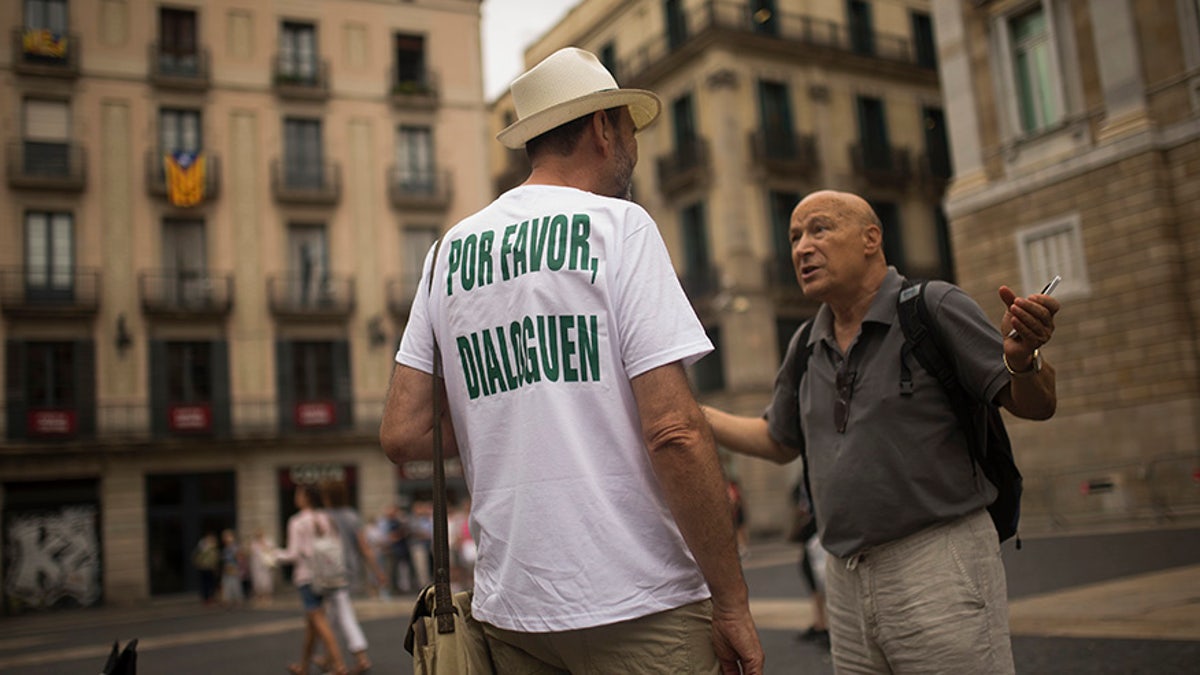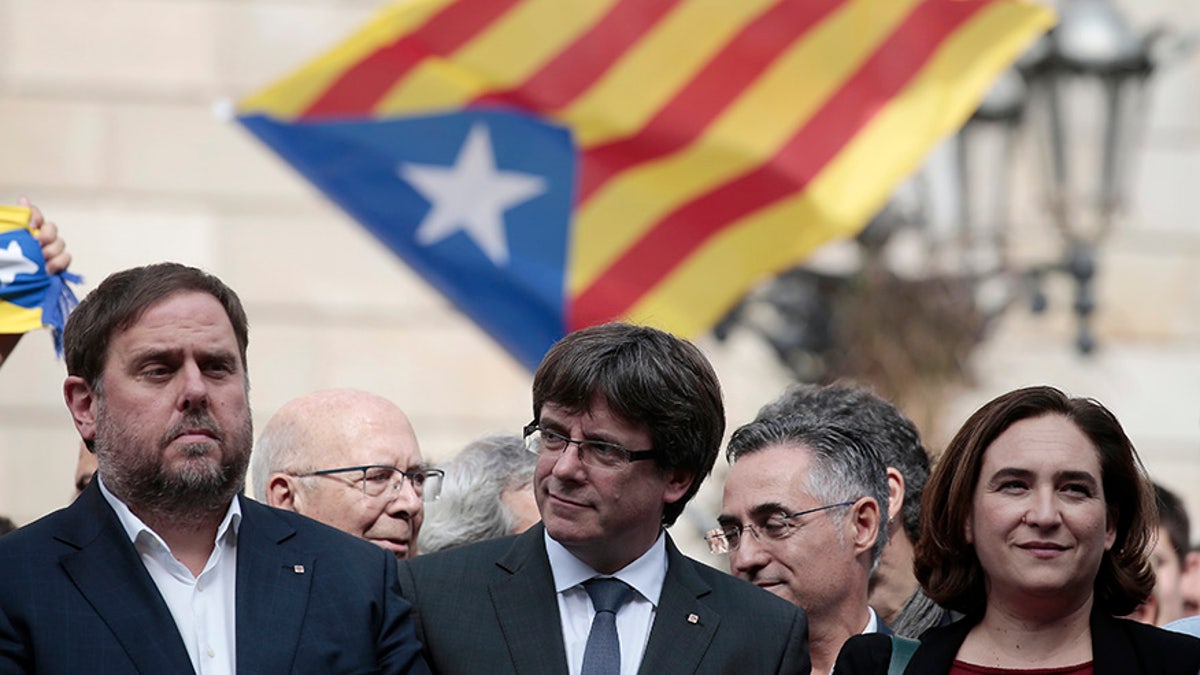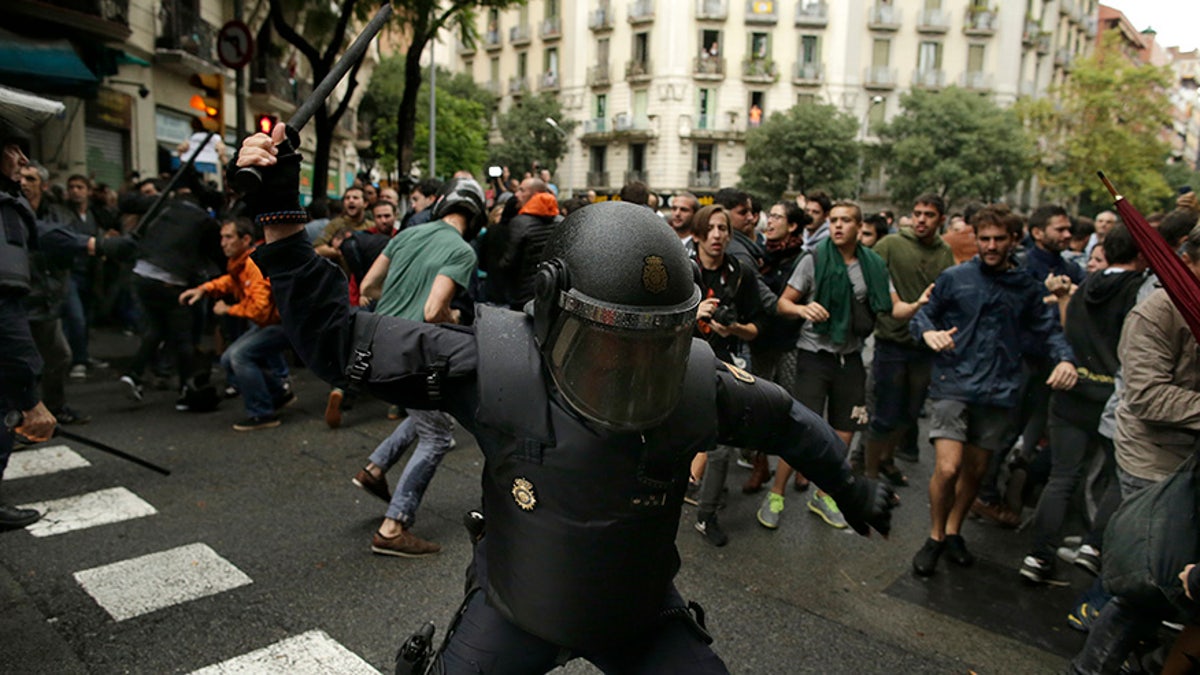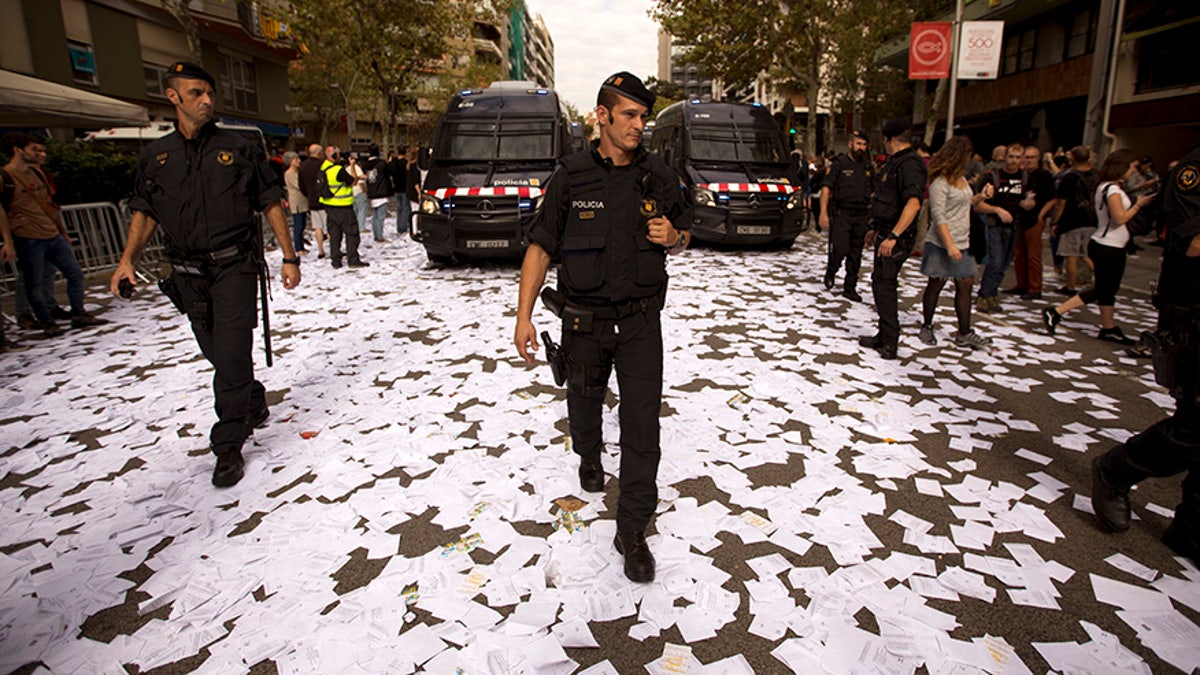
A man, wearing a t-shirt reading in Spanish: "Please, talk" chats with a passer-by about the current political situation in Catalonia, in Barcelona, Friday, Oct. 6, 2017 (AP)
Catalonia and the central Spanish government are at a standstill amid growing tensions surrounding the wealthy northeastern region’s push for independence.
Inigo Mendez de Vigo, a spokesman for Spain’s government and the cabinet’s minister of cultural affairs, declared Friday that “coexistence is broken” and called on the Catalan regional government to drop its secession bid in order to begin any form of dialogue.
Mendez De Vigo called on Catalonia’s president, Carlos Puigdemont, “to come back to the realm of reality and respect of legality and in that spirit we can negotiate and enter dialogue.”
"In order to dialogue, you must stay within the legal framework," Mendez de Vigo told reporters.
DEFIANT CATALONIA LEADERS MOVE TO DECLARE INDEPENDENCE FROM SPAIN ON MONDAY
A disputed independence referendum in Catalonia last Sunday has led to Spain's biggest political crisis in decades, with the national government in Madrid condemning the vote as illegal, unconstitutional and invalid.
Puigdemont, who has been defiant against the Spanish government, wants to address the regional parliament next week “to discuss the political situation” in Catalonia. That request comes after Spain's Constitutional Court suspended the Catalan parliament session on Monday during which separatist lawmakers wanted to discuss secession.
Mendez de Vigo warned Catalans that a parliamentary declaration of independence "is not enough" and that the international community needs to recognize independent nations.
No country has openly said it would support an independent Catalonia and the European Union says it would be kicked out of the bloc and forced to stop using the common euro currency. The EU says Catalonia would have to apply to rejoin, a lengthy, uncertain process.

Catalan President Carles Puigdemont (center) says the region is set to declare its independence from Spain "in a matter of days." (AP Photo)
Puigdemont says the referendum is valid despite a Constitutional Court ban on holding it and the fact that only 40 percent of the region's 5.5 million eligible voters turned out amid strong police pressure to shut down the vote. Catalan officials say 90 percent of those who cast ballots favored independence.
The top Spanish official in Catalonia, Enric Millo, who is in charge of security, said Friday he regretted that hundreds of people were injured Sunday in the police crackdown on the independence vote — the first statement by a Spanish official lamenting the injuries.
"I can only say sorry" for the injuries, Millo told Catalonia's TV3 television.
He also tempered the apology by saying the Catalan government was responsible for the situation by encouraging people to vote despite the Constitutional Court order suspending the referendum.
Spain has defended police actions, saying there were firm and proportionate. Videos on Sunday saw police yanking voters and others by their hair and kicking and hitting them.

FILE, In this Sunday, Oct. 1, 2017 photo, a Spanish riot police swings a club against would-be voters near a school assigned to be a polling station by the Catalan government in Barcelona, Spain, Sunday, Oct. 1, 2017. (AP Photo/Manu Fernandez, File) (Copyright 2017 The Associated Press. All rights reserved.)
Catalan authorities say about 900 people were treated for injuries during Sunday's vote, when Spain's anti-riot squads fired rubber bullets, smashed into polling stations and beat protesters with batons to disperse voters.
The political turmoil has led to unease in Spain's business sector. Spain's main stock index was down slightly Friday, with Catalan banks leading losses amid the uncertainty.
Spain's government approved a decree Friday that would make it easier for Catalan companies to move base out of the region. The move will allow for the relocation of the registration of Caixabank —Spain's third largest bank in global volume of assets. Caixabank's board was due to meet in Barcelona on Friday to discuss the issue.
At least half a dozen companies, including the fifth largest lender, Banco Sabadell, have already relocated from Catalonia or agreed to do it.
"It's very sad what we are seeing," Economy Minister Luis de Guindos said Friday. "This is the result of an irresponsible policy that is causing uneasiness in the business community."
In Madrid, Spain's National Court unconditionally released two senior officers of Catalonia's regional police force and the leaders of two pro-independence civic groups being investigated for sedition in connection with the referendum. The four are to be questioned again in coming days.
The case is linked to Sept. 20-21 demonstrations in Barcelona, when Spanish police arrested several Catalan government officials and raided offices in a crackdown on referendum preparations.

Catalan Mossos d'Esquadra officers walk a long a street covered with referendum ballots thrown by pro-independence demonstrators, during a rally in front of the Spanish Partido Popular ruling party headquarters in Barcelona, Spain, Tuesday Oct. 3, 2017. Labor unions and grassroots pro-independence groups are urging workers to hold partial or full-day strikes throughout Catalonia to protest alleged brutality by police during a referendum on the region's secession from Spain that left hundreds of people injured. (AP Photo/Emilio Morenatti) (Emilio Morenatti)
The four are Catalan police chief Josep Lluis Trapero, Catalan police Lt. Teresa Laplana, Jordi Sanchez, the head of the Catalan National Assembly, and Jordi Cuixart, president of separatist group Omnium Cultural.
After being questioned for about an hour, Trapero left the courthouse to applause by Basque and Catalan party representatives and insults from bystanders.
"I ask strongly that the Spanish government, the national parliament and the head of state (the king) understand that time and the hours are very important to find a debated solution and give way to a political solution," Sanchez said.
Spanish authorities say the demonstrations hindered the Spanish police operation, and that Catalan police didn't do enough to push back protesters blocking Spanish police officers from leaving a building.
Spanish Prime Minister Mariano Rajoy has urged Puigdemont to cancel plans for declaring independence in order to avoid "greater evils."
The Associated Press contributed to this report.








































